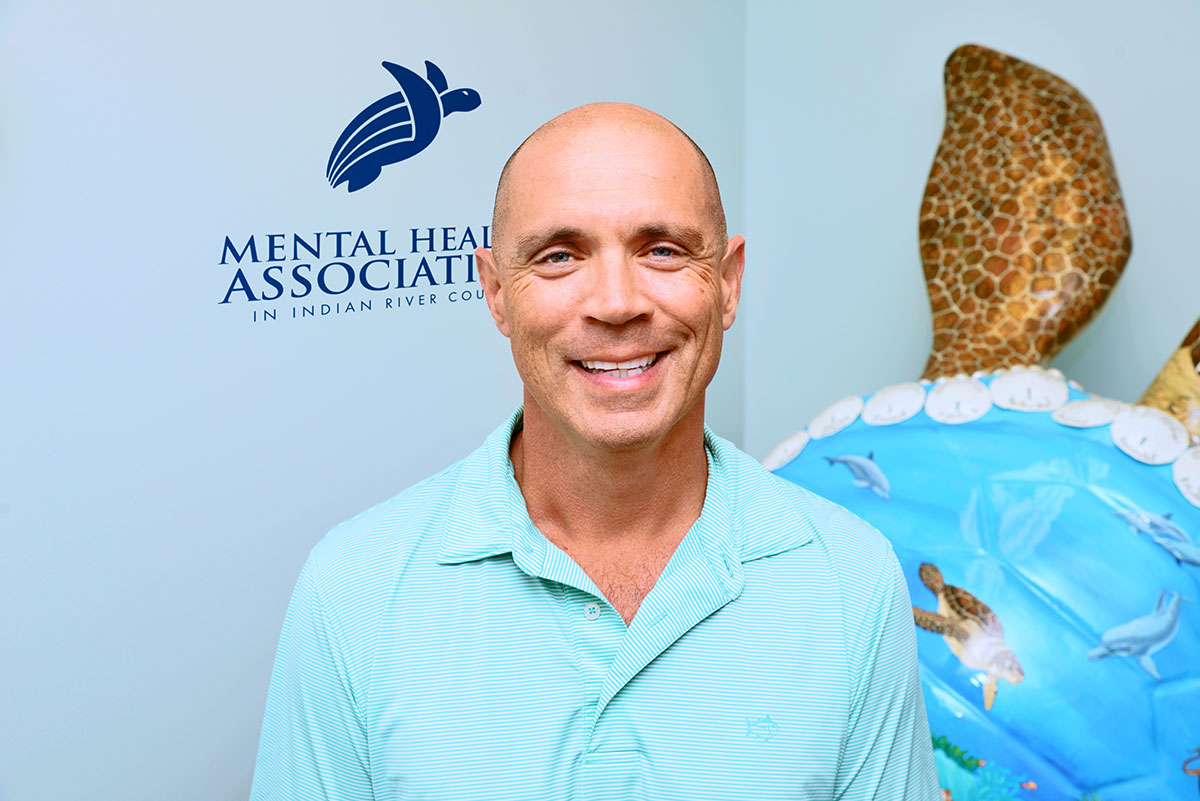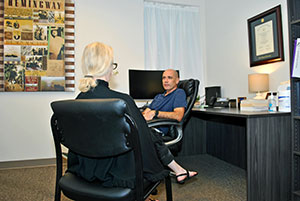The COUNSELOR

BY KERRY FIRTH
As a long-distance runner, psychologist Phil Cromer spends a lot of time thinking. He thinks about mental illness and the snowball effect it has in society. He thinks about the effects of recent isolation and quarantines. He thinks about ways to counsel those feeling the pressure and abnormality of the times.
And he even thinks about the tricks his own mind plays when he’s sleep deprived on a 100-mile trek. But, running gives him the balance and understanding to treat any number of mental illnesses he sees as the staff psychologist and chief clinical officer at the Mental Health Association in Indian River County.
Born on Long Island, NewYork, Cromer moved with his family to Jensen Beach in the 1980s where he attended Stuart Middle School and Martin County High School. He quickly adapted to being a typical Florida boy, surfing, skating and playing high school sports. It was during the visits to Vero Beach with his soccer and football teams that he fell in love with the area and knew he’d someday end up living there.
Even as a child, Cromer was level headed, methodical and always eager to fix whatever trouble came his way. He had a natural inclination to help others so it seemed like he was destined to become a counselor of some sort, he just wasn’t sure about which direction he’d take.
“I initially wanted to become a lawyer and help people from that perspective, but after graduating from Florida Atlantic University in Boca Raton and being accepted to Nova Law School, I had an epiphany that I wanted to help people more directly,” Cromer explained. “I turned down law school and chose to go into psychology and I feel like this is where I am supposed to be.”
Cromer went on to receive his masters in counseling and doctorate in counseling psychology at West Virginia University. During his time in Morgantown, West Virginia, he worked with his peers and the community as a student psychotherapist gaining experience in treatments for depression, anxiety, adjustment disorders, substance abuse and personality disorders. He also had the opportunity to work with veterans at the Louis A. Johnson VA Medical Center where he administered a variety of psychological and neurological tests and mental health screenings necessary to acquire compensation and pension benefits.
“Of course, we treated a lot of the veterans for PTSD,” Cromer said. “PTSD is the same in vets as it was in the students. Trauma is trauma, whether it happened on a battlefield, in a car wreck or as a result of an assault. The after effects of trauma linger far longer than the open wounds. The emotional damage is intense, but when a breakthrough to recovery is made it is one of the most rewarding experiences in the career of a counselor.”
Cromer was fortunate to land a director position at his alma mater, FAU, immediately after obtaining his doctorate, where he built the psychology department from the ground up to meet the needs of the university community by providing individual, group, couples, family and substance abuse counseling.
“I was the only psychologist on the campus with a student body of about a thousand so there was a long waiting list to see me,” he continued. “I loved every minute of it and working with those young minds was so rewarding.”
During the six years at FAU, he developed outreach activities to the university community and supervised and trained interns from FAU’s mental health counselor program in addition to managing the counseling centers budget and emergency crisis care.
Cromer left the comfort of the campus to open a private practice in Vero Beach.
“After several years I realized that I really missed the flurry of activity and diversity of conditions that I saw in community mental health practice,” he said. “So, I methodically started to wind down my practice and actively sought out opportunities in the Vero Beach area where I could treat a broader base where everybody had the opportunity to be treated equally.
“The MHA mission to treat everyone regardless of income appealed to me along with the stellar reputation of the organization. Plus, I welcomed the opportunity to work with an unbelievable team of professionals.”
Cromer also heads the therapy portion of the 19th Judicial Circuit Mental Health Court.
“The Mental Health Court is a highly sought-after remediation process for someone who has gotten caught on the wrong side of the law, but also has some sort of mental health diagnosis,” he explained. “This unique team approach allows for a team of lawyers, social workers and psychologists to go before a judge and recommend a program for the offender to get the help he needs to move forward as a productive member of society.”
“Right now, we’re busier than ever due to the effects of the unprecedented pandemic,” Cromer said. “About 80 percent of our clients are experiencing some sort of depressive or anxiety disorder. It’s life in general, but magnified by the isolation and uncertainty of the pandemic. The psychological effects of isolation should be taken seriously and people who are normally very even keeled are being affected.
“I’ve got clients with underlying health conditions that are literally afraid to leave the house to see their doctor,” Cromer continued. “Telehealth has been a lifesaver during this time, especially for counseling sessions, but certain conditions absolutely require the hands on approach by a medical professional. I tell them it’s time to start taking calculated risks and not jeopardize their physical health for fear of catching the virus. Wear a mask, wash your hands and limit your exposure. But by all means seek medical attention if necessary.”
Cromer stresses the importance of putting energy into every aspect of your life.
“You just can’t sit down and do nothing,” he said. “You may not be able to go to the gym but you can work around the house. You can’t go to lunch with a friend but you can do a Zoom call or reconnect with someone via phone. You can pray in a garden instead of a church. Venture out taking safety precautions for a walk on the beach or in the park. Or try something you’ve never done before like painting or cooking. You just have to keep busy because to do nothing but isolate is a recipe for depressive anxiety disorders.”
Bottom line is keeping mentally fit is every bit as important as keeping physically fit so exercise your brain, keep active and if there is a problem it’s OK to seek help.
PHILIP CROMER

Age: 49
Lives in: Vero Beach
Family: three sons, ages 8, 11 and 16
Education: Florida Atlantic University, Boca Raton, bachelor of arts degree in sociology with a minor in criminal justice; West Virginia University, Morgantown, West Virginia, master’s in counseling and doctorate in counseling psychology
Hobbies: Ultra running, swimming
What inspires you? “Seeing the results of my efforts as a clinician. There is nothing better than making a difference in people’s lives.”
Something people don’t know about me: I haven’t had a french fry since the year 2000 and gave up all fried foods in 2001.
